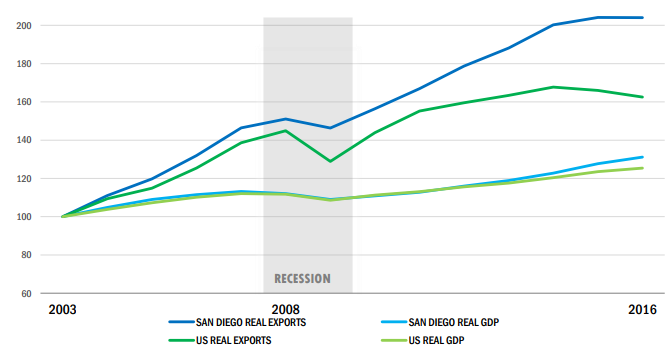Amid global political gridlock and NAFTA renegotiations, talks on trade are booming more loudly than ever. At the forefront of such conversation is President Trump’s persistent push for U.S.-produced “Made in America” goods. While manufacturing remains a key component of the U.S. trade policy – accounting for 56 percent of total U.S. exports – Brookings’ newly released Export Monitor 2017 suggests a necessary shift in policy strategy. And counter to Trump’s strategy, regions like San Diego – where a growing share of exports are service-related – may reap the benefits.
Nationally, only eight of 35 major industries experienced export growth between 2014 and 2016, led by educational and medical services, management and legal services, commodities, travel and tourism, and the technology sector – noting a particular uptick in international attractiveness of U.S. universities and hospitals. That said, the report indicates that if current trends continue, services will surpass goods as the largest export category in 2020 within the 100 largest metro areas.
Taking a closer look at San Diego, a highly connected innovation economy, the report shows:
- San Diego ranks as the 15th largest metropolitan region in the U.S. in terms of its GDP and the value of its real exports ($22.9 billion).
- When comparing export intensity among the top 100 metropolitan regions, San Diego ranks 37th (9.9 percent) – this is up from 50th (10.03 percent) in 2014.
- A total of 134,350 jobs were supported by exports; 66,940 of which are direct jobs.

Manufacturing is an important part of San Diego’s economy and that will not change. However, With manufacturing exports on the decline and services exports on the rise, Brookings’ Export Monitor suggests challenges for President Trump’s “Made in America” agenda. The administration’s trade strategy cannot merely be a manufacturing strategy; it must also include promoting and expanding access for services exports. This means addressing barriers like physical presence requirements, local data storage mandates, temporary staff relocation restrictions, cross-border data flow constraints; it means continuing to confront discriminatory practices and offshoring, and technological advancement and workforce development that sustain regional competitiveness.
As an innovation economy, home to a world-renowned life sciences and defense ecosystem, services exports (think: IP) are among top priority in San Diego. And as the third most patent-intensive region in the world, connectivity to foreign markets – especially as it relates to sharing San Diego-made, life-changing technologies and discoveries with the rest of the world – and a balanced trade policy is make or break.
See more in Brookings’ full report, San Diego export scan and press release.